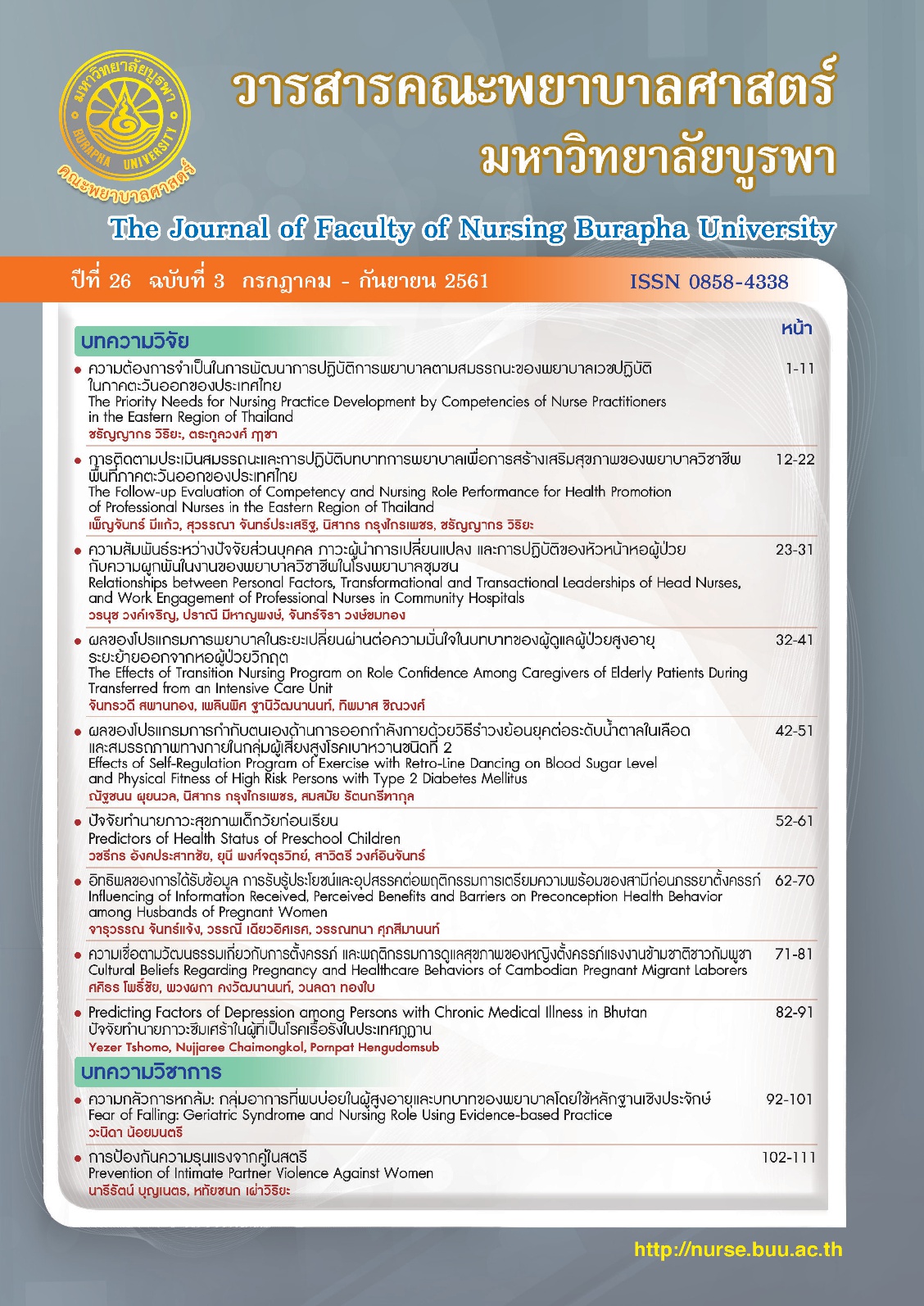ความเชื่อตามวัฒนธรรมเกี่ยวกับการตั้งครรภ์ และพฤติกรรมการดูแลสุขภาพของหญิงตั้งครรภ์แรงงานข้ามชาติชาวกัมพูชา
คำสำคัญ:
หญิงตั้งครรภ์, แรงงานข้ามชาติ, ความเชื่อตามวัฒนธรรม, พฤติกรรมการดูแลสุขภาพบทคัดย่อ
บทคัดย่อ
การวิจัยครั้งนี้เป็นแบบพรรณนา มีวัตถุประสงค์เพื่อศึกษาความเชื่อตามวัฒนธรรมเกี่ยวกับการตั้งครรภ์ และพฤติกรรมการดูแลสุขภาพของหญิงตั้งครรภ์แรงงานข้ามชาติชาวกัมพูชา กลุ่มตัวอย่างคัดเลือกโดยการสุ่มแบบหลายขั้นตอน เป็นหญิงชาวกัมพูชาที่มารับบริการฝากครรภ์ในโรงพยาบาล จังหวัดสระแก้ว จำนวน 180 คน เก็บรวบรวมข้อมูลระหว่างเดือนสิงหาคม พ.ศ. 2559 ถึงมีนาคม พ.ศ. 2560 เครื่องมือวิจัยประกอบด้วยแบบสัมภาษณ์ข้อมูลส่วนบุคคล แบบสัมภาษณ์ความเชื่อตามวัฒนธรรมเกี่ยวกับการตั้งครรภ์ และแบบสัมภาษณ์พฤติกรรมการดูแลสุขภาพหญิงตั้งครรภ์ มีค่าความเชื่อมั่นสัมประสิทธิ์แอลฟาครอนบาคเท่ากับ .73 และ .78 ตามลำดับ วิเคราะห์ข้อมูลโดยใช้สถิติพรรณนา การทดสอบที และการวิเคราะห์ความแปรปรวนแบบทางเดียว
ผลการวิจัยพบว่า ความเชื่อตามวัฒนธรรมเกี่ยวกับการตั้งครรภ์โดยรวมมีค่าเฉลี่ยเท่ากับ 45.11 (SD = 0.14) ซึ่งอยู่ในระดับปานกลาง และพฤติกรรมการดูแลสุขภาพมีค่าเฉลี่ยเท่ากับ 3.32 (SD = 0.22) ซึ่งอยู่ในระดับปานกลางเช่นกัน ผู้ที่พำนักในประเทศไทย 13 เดือนขึ้นไป มีพฤติกรรมการดูแลสุขภาพมากกว่าผู้ที่พำนักในประเทศไทยน้อยกว่าหรือเท่ากับ 12 เดือน (p <. 05) ผู้ที่ไม่สามารถสื่อสารภาษาไทยได้เลย มีพฤติกรรมการดูแลสุขภาพน้อยกว่าผู้ที่สามารถสื่อสารภาษาไทยระดับดีมาก ระดับดี และระดับน้อย (p < .05) และผู้ที่มีความเชื่อตามวัฒนธรรมเกี่ยวกับการตั้งครรภ์ระดับน้อย มีพฤติกรรมการดูแลสุขภาพมากกว่าผู้ที่มีความเชื่อตามวัฒนธรรมเกี่ยวกับการตั้งครรภ์ระดับปานกลาง และมาก (p < .05) แต่อายุ และจำนวนครั้งที่ตั้งครรภ์แตกต่างกันมีพฤติกรรมการดูแลสุขภาพไม่แตกต่างกัน (p > .05) พยาบาลหรือผู้มีหน้าที่เกี่ยวข้องด้านสุขภาพควรส่งเสริมพฤติกรรมการดูแลสุขภาพในหญิงตั้งครรภ์ที่เป็นแรงงานข้ามชาติ โดยเฉพาะกลุ่มผู้ที่มีระยะเวลาอยู่ในประเทศไทยน้อยกว่าหรือเท่ากับ 12 เดือน ผู้ที่ไม่สามารถสื่อสารภาษาไทยได้ และผู้ที่มีความเชื่อตามวัฒนธรรมเดิมอยู่มาก
เอกสารอ้างอิง
Boules, N. (2012). Culture birthing practices and experiences. Parramatta, Australia: Dreamvision design.
Chairit, W. (2014). The socio - economic and political relationship between Vietnamese immigrants and the local Thais in Phatthalung. Unpublished master thesis, Faculty of Arts Programme in Vistual, Chiang Mai University. [in Thai]
Chamchan, C. (2014). Reproductive health of cross-border migrants in Thailand. In J. W. Huguet, Thailand migration report. Bangkok: United Nations Thematic Working Group on Migration in Thailand. [in Thai]
Charoenmukayanan, S., Sakulpanich, T.,Thamwanna, P., Sawangjang, A., & Sukruengrong, N. (2013). The study on situation of Cambodians health at Thai-Cambodian Border: A case study of Sa Kaeo, Chanthaburi, Trat. Bangkok: Bureau of international health, Ministry of public health. [in Thai]
Chumsri, T. (2005). Relationships between personal factors, perceived benefits, perceived barriers, perceived self-efficacy, interpersonal influencences and health promoting behaviors of pregnant adolescents, Southern region. Journal of Nursing Science Chulalongkorn University, 19(1), 94-107. [in Thai]
Cheungmeng, P., & Pheụxncho, R. (2014). Intercultural communication competence and self-adaptation Chinese students in Rangsit University. Journal of Business Research and Administration, 4(1), 634-655. [in Thai]
Chimcharoen, S., Maneesriwonggul, W., & Terathongkum, S. (2012). Relationships between personal factors, beliefs in pregnancy perception of health promotion and health promoting behaviours among Thai-Muslin pregnant woman. Journal of Faculty of Nursing Burapha University, 20(3), 35-40. [in Thai]
Khatshima, K. (2004). Khmer superstition basics: A study to understand. Damrong Journal of The Faculty of Archaeology Silpakorn University, 3(5), 249-260. [in Thai]
Krejcie, R. V., & Morgan, D. W. (1970). Determining sample size for research activities. Educational and Psychological Measurement, 30(3), 608-609.
Lowdermilk, D. L., Perry, S. E., Cashion, K., & Alden, K. R. C. (2012). Maternity & woman's
healthcare (10th ed.). New York: Elsevier.
Pender, N., Carolyn, M., & Mary A. P. (2006). Health promotion in nursing practice. Upper Saddle River, New Jersey, United States: Prentice Hall.
Ruela, R. (2015). Self-care behaviours of pregnant aldolescent and adults : A case study of Rue Sao district, Narathiwat province. Unpublished master thesis, Public Health Program in Community Health, Songkhla Rajabhat University. [in Thai]
Sawasdipanich, N. & Tiansawad, S. (2011). Instrument translation for cross-cultural research: Technique and issues to be considered. Thai Journal of Nursing Council, 26(1), 19-28. [in Thai]
Sirichotiyakul, S. (2009). High risk pregnancy mangement. Chiang Mai: Jarus business printing Service. [in Thai]
Tamteangtrong, R., Sangin, S., & Deoisres, W. (2017). Factors predicting nutritional health
promoting behaviors among pregnant adolescents. Journal of Faculty of Nursing Burapha University, 25(1), 49-60. [in Thai]
Wapee, M. (2013). Perceived benefits, perceived barriers and health promoting behaviors of pregnant women, Lao people's democratic republic. Unpublished master thesis, Faculty of Nursing, Chiang Mai University. [in Thai]
Wisetpholchai, B. (2013). “Chlong Tonnle”: Preservation of traditional medicine in pregnancy, childbirth and postnatal care in Cambodia, Case Study of Sihanoukville Cambodia. In T. Phatcharanuruk, The study of Thai wisdom on health knowledge and health culture in Asian Society (pp. 60-101). Bangkok: Health Systems Research Institute. [in Thai]
Witviroj, T. (2009). Communication competence and acculturation of foreigners living in Bangkok. Unpublished master thesis, Faculty of Communication Arts, Bangkok University. [in Thai]
White, P.M. (2001). Crossing the river: Khmer women’s perceptions of pregnancy and
postpartum. Journal of Midwifery & Women’s Health, 47, 113-126
Yun, S. (2013). Comparison of beliefs between Cambodians and Koreans on pregnancy, and childbirth. Unpublished master thesis, Faculty of Art, Korean Studie, Chulalongkong University. [in Thai]





